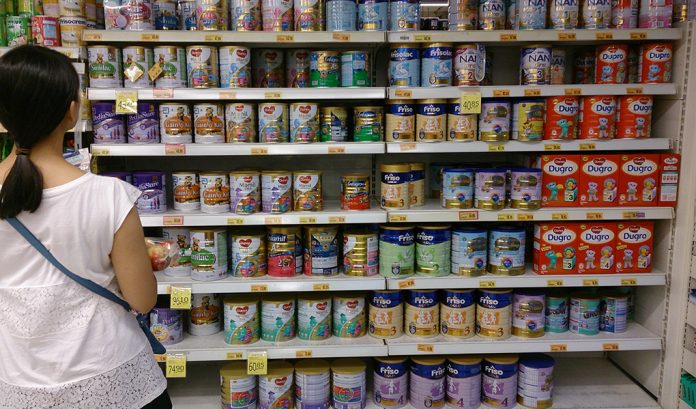
The Breastfeeding Movement has found another feather to add to its cap with this news! The University of California in San Diego, United States has discovered, through a scientific study, that free fatty acids generated during the digestion of infant formula causes cellular death, and may contribute to often fatal necrotizing enterocolitis, a serious intestinal condition that commonly occurs among premature infants.
Necrotizing enterocolitis happens when tissue in the small or large intestines becomes inflamed or injured. This leads to the death of intestinal tissues or, in rare cases, a hole appears in the intestinal wall, preventing the baby’s intestines to hold waste. Bacteria also seeps through the hole and enters the bloodstream of the baby which may lead to infection or make the baby direly sick.
University of California in San Diego bioengineers based their report on in vitro tests observing and comparing the digestion of fresh human breast milk and nine different infant formulas. Published online in the journal Pediatric Research, the study’s researchers already know that premature infants that are fed formula milk are more likely to develop necrotizing enterocolitis than those fed with breast milk.
Necrotizing enterocolitis has been the leading cause of death from gastrointestinal diseases in premature infants – but the cause or underlying mechanism behind it has not been fully understood. However, a research scientist named Alexander Penn who was working in the Microcirculation Laboratory of Bioengineering Professor Geert Schmid-Schonbein from the UC San Diego Jacobs School of Engineering might have come to the eureka moment.
Penn and other researchers already have a clue that the intestines of healthy adults and adult children have a mature mucosal lining that may prevent damage due to free fatty acids (free fatty acids have a “detergent capability” which means they can harm cell membranes easily).
However, the intestines of preterm infants are leakier at birth – explaining why they are more inclined to developing necrotizing enterocolitis.
So the researchers worked on what happens to breast milk and infant formula milk when exposed to digestive enzymes. The scientists took both types of milk into the lab and exposed them to pancreatic enzymes or fluid from an intestine. Then, they tested the formula milk and breast milk for free fatty acids.
They also tested the capability of these free fatty acids in killing off 3 types of cells linked with necrotizing enterocolitis. These cells are: a) epithelial cells that line the intestine; b) endothelial cells that line blood vessels; and c) neutrophils, which is a type of white blood cell that acts as a first responder to inflammation caused by trauma in the body.
The results were staggering! Cellular death or cytotoxicity occurred in less than 5 minutes in some cases of formula digestion – which did not happen with breast milk digestion. Moreover, digestion of infant milk formula caused death in 47% to 99% of neutrophils, while only 6% died as a result of breast milk digestion.
The researchers found out that breast milk happens to have a built-in mechanism to fight cytotoxicity. While formula milk generates high levels of free fatty acids during digestion, breast milk is digested in a slower, more controlled way.
Many neonatal intensive care units (NICU) now are pushing for more formula-free environments. However, this can be quite challenging since supplies of breast milk for premature infants are hard to come by. The study’s researchers are recommending more research on less cytotoxic milk replacements for preterm infants so they are exposed to less cell damage and necrotizing enterocolitis. In fact, this kind of formula should also benefit not just preterm infants but also full-term infants at higher risk of gastrointestinal disorders and leaky intestines.
Here in the Philippines, this news supports the long-standing breastfeeding program of the government, particularly those in the rural areas wherein infant mortality tends to be high. Since infant milk formula still costs a lot for some poor folks in the rural areas, teaching new mothers to breastfeed their babies would be a better and healthier option for all.
The researchers are looking into replicating these encouraging results in animal studies and perhaps, intervention from preventing free fatty acids from generating necrotizing enterocolitis or causing intestinal damage.
The research was carried out in collaboration with Dr. Taylor, Karen Dobkins of the Department of Psychology, and Angelina Altshuler and James Small of the Department of Bioengineering at UC San Diego. The study was funded by the National Institutes of Health (NS071580 and GM85072).
Story Source:
University of California in San Diego website: http://www.ucsd.edu/
Journal Reference:
Alexander H. Penn, Angelina E. Altshuler, James W. Small, Sharon F. Taylor, Karen R. Dobkins, Geert W. Schmid-Schönbein. Digested formula but not digested fresh human milk causes death of intestinal cells in vitro: implications for necrotizing enterocolitis. Pediatric Research, 2012; DOI: 10.1038/pr.2012.125
Photo Credit: Alexander Penn, Department of Bioengineering, UC San Diego Jacobs School of Engineering. Blue tint added for visual clarity.
Copyright 2024, DoctorFarrah.com








